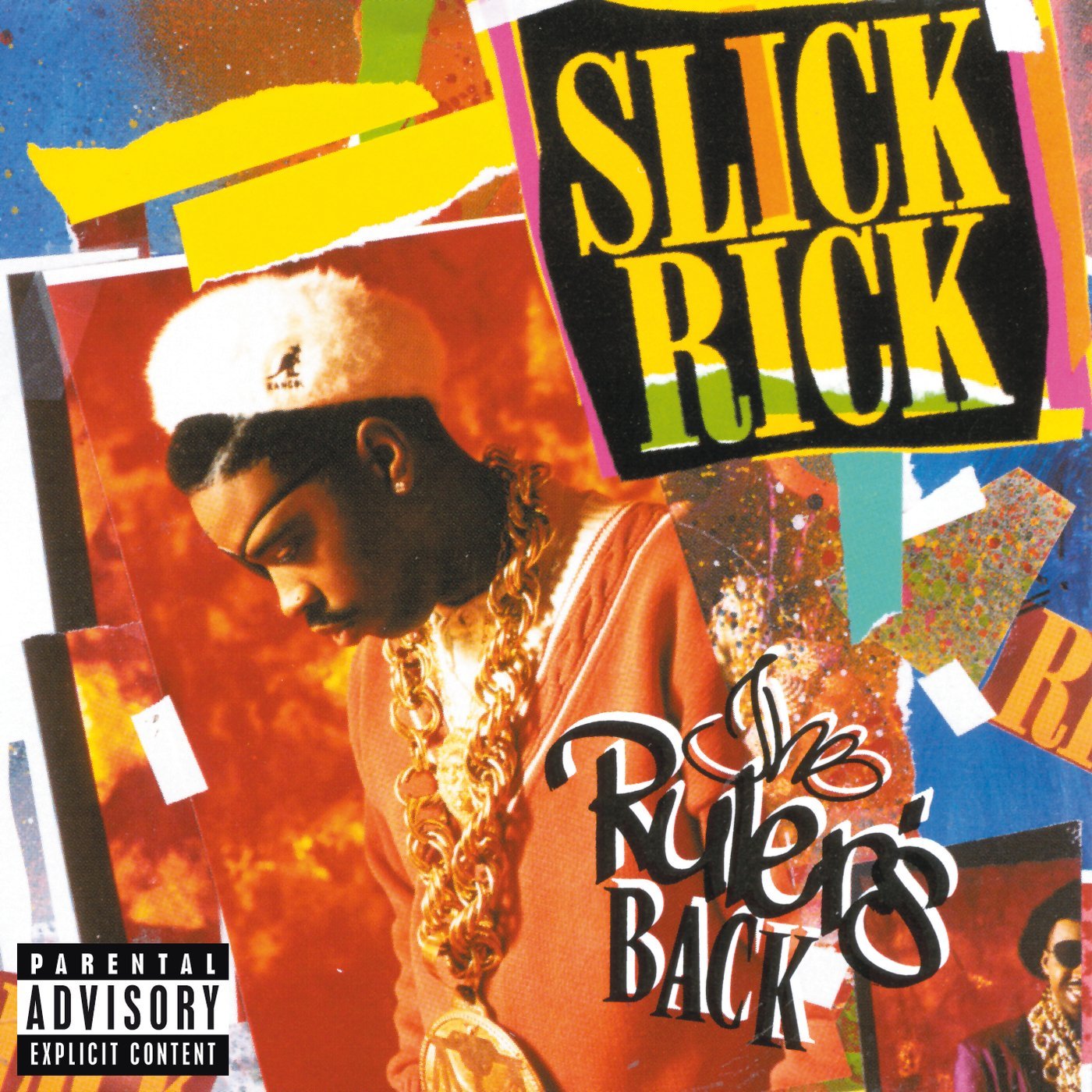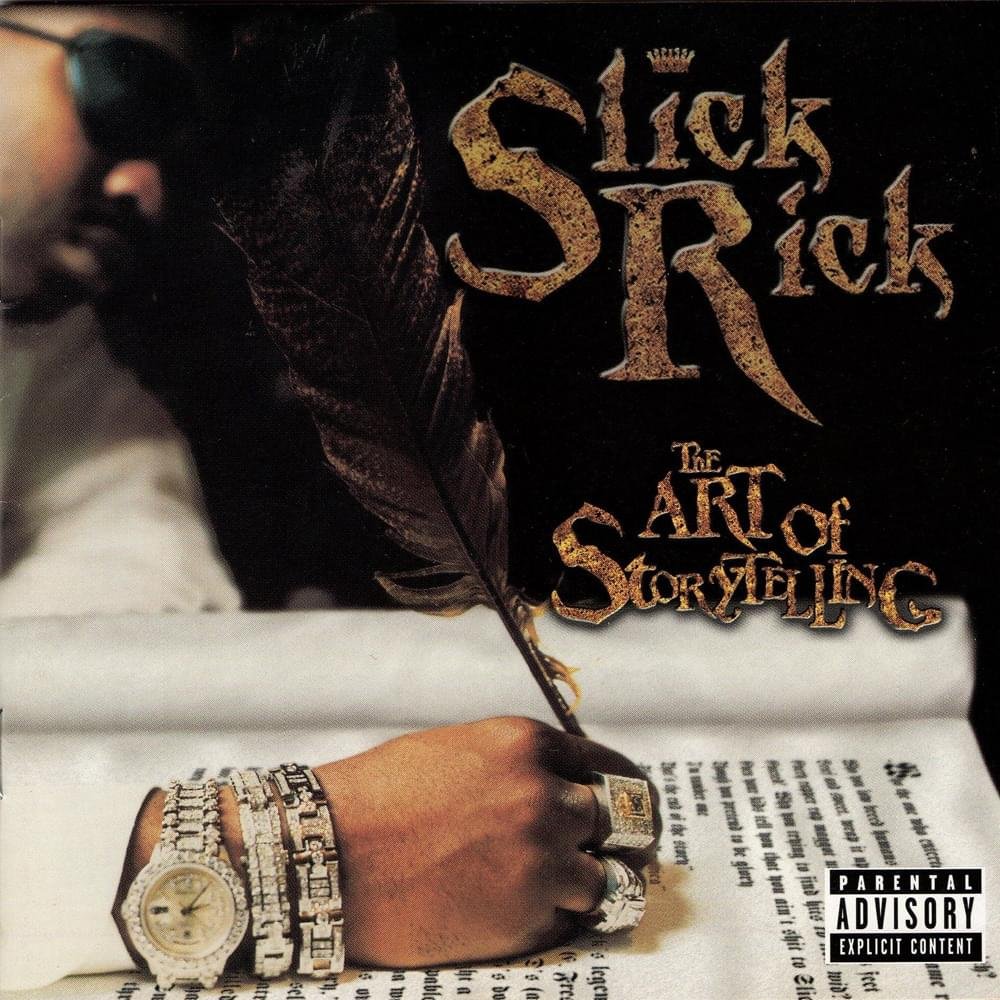Happy 35th Anniversary to Slick Rick’s debut album The Great Adventures of Slick Rick, originally released November 1, 1988.
Storytelling through rhyme has been part of hip-hop since its beginnings. Ever since Wonder Mike of the Sugar Hill Gang kicked Grandmaster Caz’s rhymes about soggy macaroni and chicken that tasted like wood, rappers have used their storytelling abilities to keep the party people entertained. And few in hip-hop’s history could spin a lyrical yarn like “Slick” Rick Walters first did on his debut album The Great Adventures of Slick Rick, released 35 years ago.
The London born, Bronx raised Slick Rick first honed his skills at New York City’s famed Laguardia High School of Music & Art, where he hung out with peers like Dana Dane, and the two formed the Kangol Krew. He met rapper/beatbox extraordinaire Doug E. Fresh in 1984 at the age of 19, and the two recorded the powerful one-two punch of “The Show” and “La Di Da Di,” two of the most revered tracks in hip-hop history. The two tracks were club anthems and became two of the most sampled tracks ever.
Rick ended up leaving Doug’s Get Fresh Crew for reasons that have never been clear. He signed with Def Jam Records in 1986 as one of the label’s first artists, then spent the next two years putting together his debut album, which is now universally recognized for its excellence. The Great Adventures ranks among the best hip-hop albums ever released, and Slick Rick and his influence continue to shape hip-hop.
Since he first rhymed on “The Show” and “La Di Da Di,” Rick built his rep on his distinctive voice (tinged by his native British accent), perfect enunciation, effortless cadence, sharp sense of humor, and strong narrative style. All of these are flawlessly displayed and executed throughout The Great Adventures.
Rick tells his tales through his creation of the character The Ruler, who’s an extension of most rappers’ idea of superiority. As The Ruler, Rick exists on a plane above the mere mortals, dismissing “crumbs” as being beneath him, and resolving to reign over the realm of hip-hop with a proverbial iron fist in a velvet glove. With this persona, Rick projected an unmistakable swagger before most emcees even conceived of the notion.
The production on the album was split between Slick Rick himself (with assistance from Vance Wright), Bomb Squad members Hank Shocklee and Eric Sadler, and Jam Master Jay of Run-DMC. Shocklee, Sadler, and JMJ were apparently brought in by Def Jam to both remix tracks originally produced by Rick and put together beats for him to use. In Brian Coleman’s Check the Technique, Rick comes off as less than enthused about the outside collaborations. Regardless, most if not all tend to work really well and do fit in with the rest of the album’s soundscape.
It makes sense that the album opens with the simultaneously funny and filthy “Treat Her Like a Prostitute.” The song, where Rick tells three different tales of infidelity in the second person, is an old routine that Rick used to perform with Doug E. Fresh at parties and shows. Rick has said it was the only song featuring rhymes from older material, and that he had written the rest of the tracks specifically for The Great Adventures. Even with its extremely explicit nature, Rick oozed the necessary panache to pull off a graphic tale of “your” wife’s sexual escapades with the mailman.
Watch the Official Videos:
The album functionally begins with “The Ruler’s Back,” a melodic and ostentatious track produced by Jam Master Jay. Rick basks in his return to the mic, as the song is the aural equivalent of him rolling through the streets of his kingdom on a golden chariot pulled by a dozen thoroughbreds. The track is simultaneously ostentatious and delicate, punctuated by horns and a piano track that sounds influenced by Les McCann’s “Roberta.” Lyrically, the song is classic Rick, as with one hand he excoriates the scoundrels who would dare bite his style out of jealously, while regally forgiving them for their trespasses with the other.
The album’s first two singles showcase the narrative ability that became Rick’s trademark. “Children’s Story” is on many a shortlist for greatest hip-hop songs of all time, and certainly among the two or three best storytelling raps ever recorded. A classic tale of the perils of getting caught up in the street life, the song’s clear plotline is populated by unsavory characters like Dave the Dope Fiend, who enrich the song’s overall scope. The musical backdrop for the song manages to be both dark and upbeat, making it a timeless club staple that has endured for three-and-a-half decades.
“Teenage Love” is far less iconic, though still memorable, as Rick chronicles the ups and downs of love through the eyes of high schoolers. The track is filled with insights into how teenagers deal with relationships, including their eventual dissolution. In Coleman’s Check the Technique, Rick expressed his displeasure with the Shocklee and Sadler version of the song, preferring the more uptempo version that he originally produced. It’s unclear whether Rick singing “Theme For Mahogany” would have sounded better over a faster track.
“Mona Lisa” is one of the album’s most club-friendly entries, as Rick kicks game to a woman on the street, ending with him (through a voice modifier) singing “Walk On By.” But songs like “Kit (What’s the Scoop)” and “Teacher, Teacher” deal with “biters, slimy sluts, and fake rhyme writers” trying to get over on him.
On “Kit (What’s the Scoop),” Rick gets help from the eponymous 1982 Pontiac Firebird, apparently on loan from Michael Knight and the Foundation for Law and Government, in order to track down the vandals who stole his crown and his records. Meanwhile, “Teacher, Teacher” features Rick lambasting those who attempt to appropriate his style. Both stories are light-hearted fun where Rick doesn’t take things too seriously, and are bolstered by his own creative descriptions of the ancillary characters. For example, the one who stole Rick’s crown is “some brother looking like a hen,” and on “Teacher, Teacher” he’s confronted by “Big Foot and the Toes.”
Given the invincible Superfly persona that Rick crafts for himself through The Great Adventures, “The Moment I Feared” further demonstrates Rick’s genius. Amidst the grand tales of fawning females and dastardly scalawags, the song serves as a way to deflate his own legend. Rick basically places The Ruler character in the “real” world, devoid of talking cars and scheming rogues.
After using the first verses to establish himself as a “fly Brown brother,” he heads to the Latin Quarter to catch Boogie Down Productions, only to have the bona fide hard rocks jack him for his (fake?!?!) gold chains. Later, he tries to dabble in the street life, inspired by killing his best friend after he catches Rick having sex with his girl, only to get caught after being too inept to properly cover for his crime. He ends the song in prison, the victim of prison rape, which he plays for dark humor.
Slick Rick walks the line between goofy and vulgar throughout The Great Adventures. “Indian Girl (An Adult Story)” splits the difference, starting off as a light-hearted tale of Davey Crockett wooing the Indian princess Running Rabbit, daughter of Big Chief Beretti (1988 was a far less enlightened time). In its final verse, the song takes a left turn into almost shockingly explicit territory, as the two consummate their relationship, ending with a fairly racist “punchline” (again, it was 35 years ago).
Enjoying this article? Click/tap on the album covers to explore more about Slick Rick:
A song like “Hey Young World,” the album’s third single, would seem almost completely out of place on an album with “Indian Girl” or vice versa, if not for Rick’s skill and conviction. The juxtaposition speaks to Rick’s versatility as an emcee, demonstrating that he could be both crass and wholesome in equal measure and have both sides seem at peace with each other.
“Hey Young World” is as heartfelt and, well, wholesome as “Treat Her Like a Prostitute” is bawdy. Rick uses the song to address future generations, encouraging them to, among other things, stay out trouble, respect their parents, and do their chores. Moreover, Rick hopes to inspire kids to live their best lives. It’s motivational without being corny or preachy. It is as much of a product of the time as “Treat Her Like a Prostitute” or “Indian Girl.”
Rick saves the album’s best for last with “Lick the Balls,” where Rick forgoes all attempts at telling a story and just focuses on “hitting harder than a fucking brick.” Produced by the Shocklee and Sadler team, Rick flows over stripped-down percussion and scratches from Funk Inc’s “Kool Is Back” and J.J. Johnson’s “Pull, Jubal, Pull.” Rick uses four 12-bar verses to eviscerate his competition with lines like, “Who’s hitting rough in ’88? I bet your momma knows / Backslap you all down like y’all were dominoes / Stun ’em all, come on y’all, give me a taste of life / Act trife, I'll let my dog go fuck your wife.”
Much of Slick Rick’s career post The Great Adventures is an exercise in “What could have been?”, as he lost many of his “prime” years as an emcee to incarceration. In 1991, he pled guilty to two counts of attempted murder and other charges after shooting his first cousin and former bodyguard and an innocent bystander, and was sentenced to 3 to 10 years in prison. The shadow of his conviction continued to haunt him for years, almost leading to his deportation (Rick had never applied for American citizenship), until he was pardoned by the Governor of New York in 2008, and eventually became a U.S. citizen.
It speaks to the overwhelming quality of The Great Adventures that Slick Rick was about to cement his legend mostly around that one album. During and even before his incarceration, Rick was considered one of, if not the best storytelling emcee, and appeared on many a top five list. He’s influenced countless emcees, and you can hear his impact in rappers like Biggie Smalls, Snoop Dogg, Nas, Jay-Z, Ghostface Killah, and Ludacris, among scads of others.
To this day, Rick remains respected as one of hip-hop’s elder statesmen. His legacy has endured through his many trials and tribulations, and his contributions to the genre remain indelible. Few have played their role as well as Rick, and as a result, The Great Adventures of Slick Rick remains an essential component of the artform’s rich history.
LISTEN:
Editor's note: this anniversary tribute was originally published in 2018 and has since been edited for accuracy and timeliness.



